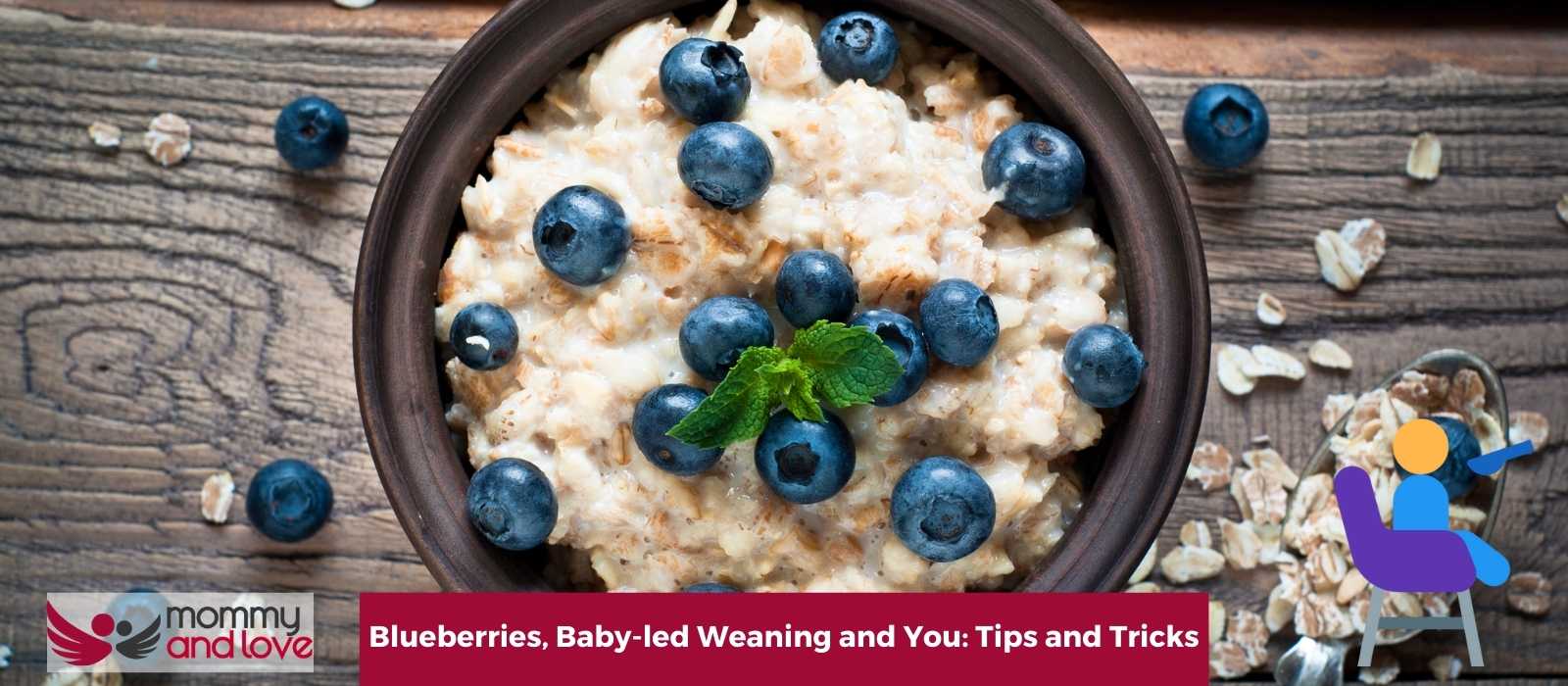If you’re looking for a nutritious and delicious way to introduce your baby to solid foods, look no further than blueberries!
Blueberries are perfect for baby-led weaning (BLW), as they are soft enough for your little one to chew, yet still, provide plenty of nutritional benefits.
In this blog post, we will discuss some tips and tricks for incorporating this fresh fruit into baby food. We will also share some recipes that are sure to please both parents and babies alike!
What Are the Health Benefits of Fresh or Frozen Blueberries on Babies?
Yes! Blueberries are fantastic finger foods and are an excellent source of essential nutrients, vitamins, minerals, and antioxidants. They are also low in calories and fat. Here are some of the nutrients that blueberries offer:
Vitamin C
This vitamin is important for babies because it helps their bodies absorb iron. Iron is important for babies because it helps their blood carry oxygen to their cells. This vitamin also helps protect babies from infection.
Most babies get enough of this vitamin from breast milk or formula, but some younger babies may need extra vitamin C.
Vitamin K
This vitamin is important for babies because it helps with blood clotting. This vitamin also helps prevent osteoporosis (a condition where bones become weak and fragile).
Babies are born with very low levels of this vitamin. They need to get this vitamin from their diet in order to build up their stores.
Blueberries are a good source of this vitamin. Just one cup of blueberries contains about 24 micrograms of vitamin K. This is about 30% of the recommended daily amount for babies!
Manganese
Manganese is a mineral that is important for babies because it helps their bodies develop and grow. It also helps with metabolism, bone development, and wound healing.
Fiber
It is essential for keeping babies regular. It also helps to prevent constipation and other gastrointestinal issues. Fiber can be found in fruits, vegetables, and whole grains. Babies need about two ounces of fiber per day.
Antioxidants
Blueberries are a good source of antioxidants and babies need all the antioxidants they can get even though they can get it from breast milk. These nutrients help protect babies’ cells from damage.
Antioxidants are nutrients that protect cells from damage by free radicals. Free radicals are created when the body breaks down food, or when you smoke or breathe in second-hand smoke.
Scientists believe that free radical damage may play a role in diseases such as cancer and heart disease. Antioxidants can help protect against this damage and may lower disease risk.
All of these nutrients are important for a baby’s growth and development. Blueberries, therefore, make an excellent addition to any BLW meal plan.
When Can Babies Eat Blueberries?
The American Academy of Pediatrics recommends that babies start solid foods around six months of age.
However, every baby is different. Some babies may be ready to start BLW as early as four months old, while others may not be ready until seven or eight months old.
It’s important to wait until your baby is developmentally ready to start BLW before you introduce blueberries. Signs that your baby may be ready for solid foods include:
- Sitting up with minimal or no support
- Good head control
- Reaching for baby food
- Putting everything in their mouths
If you’re not sure if your baby is ready for BLW and new foods, talk to your baby’s pediatrician for professional medical advice.
Are Fresh Blueberries a Common Choking Hazard for Babies?
Blueberries are a choking hazard due to their round shape. This is why it’s important to wait until your baby is developmentally ready to start solids. When they’re ready and depending on your baby’s age, you can help prevent choking risk by:
- Cutting the fresh blueberries in half
- Serve blueberries mashed
- Flatten blueberries into a disc
- Cooking the blueberries
Can Babies Be Allergic to Blueberries?
Yes, but a blueberry allergy is extremely rare. Babies who are allergic to salicylates may have an allergic reaction to blueberries. Salicylates are a type of chemical that is found in some fruits and vegetables. If you think your baby may be allergic to blueberries, talk to your pediatrician.
Can Babies Eat Whole Blueberries?
For babies under the age of four, it’s recommended that you not give them any whole berries due to them being choking hazards. Avoid serving blueberries whole so you should cook the blueberries until they are soft and then puree them before feeding them to your baby.
Can Babies Eat Blueberry Jam?

Yes, babies can eat blueberry jam! Blueberry jam is a great source of antioxidants and vitamins for your little one.
Just be sure to check the label for sugar content, as some brands can be high in sugar. You can also make your own blueberry jam at home with fresh or frozen berries. Give it a try at breakfast time or as a healthy snack for your baby!
How to Prepare Blueberries for Baby-Led Weaning
Now that we know how healthy blueberries are for babies, let’s discuss some ways to incorporate them into your homemade baby food.
One of the easiest ways to give your baby blueberries is to put them in a mesh feeder. Mesh feeders are designed for babies who are just starting solid foods. They allow your baby to gum and suck on the food, without actually swallowing it. This is a great way to let your baby explore new flavors and textures without worrying about choking.
Consider serving frozen blueberries because they might appeal more due to drastic sensory changes.
Another way to give your baby blueberries is to mix them into oatmeal or pureed foods. You can also add them to yogurt or smoothies. Just put quartered blueberries or whole blueberries in a blender or food processor. Blend to your desired consistency.
Here are some blueberry recipes that are sure to please both parents and babies alike:
Blueberry Banana Oatmeal
Ingredients:
- ¼ cup rolled oats
- ¾ cup water
- ½ ripe banana
- ¼ cup blueberries
Instructions:
Bring the water to a boil in a small pot. Add the oats and stir. Mash the banana and add it to the pot. Stir in the cooked blueberries. Cook for one more minute, then remove from heat. Let cool slightly before serving to your baby.
How to Puree Blueberries for Babies
Ingredients:
- ½ cup blueberries
- ¼ cup water
Instructions:
Add the blueberries and water to a small saucepan. Cook over medium heat until the blueberries start to pop. Remove from heat and let cool slightly. Use a fork or potato masher to mash the blueberries. Serve the blueberry puree as is, or mix it into other foods.
What Other Foods Can You Pair With Blueberries for Baby-Led Weaning?

Some other foods that go well with blueberries are apples, bananas, and pears. You can also pair them with other soft fruits like grapes, mangoes, and papayas.
If you want to add some vegetables to the mix, sweet potatoes, carrots, and peas are all good options. Lastly, don’t forget about the dairy yogurt, cottage cheese, and milk all go well with blueberries. Wild blueberries go well with meats.
The possibilities are endless, so get creative and have fun exploring new flavor combinations for your baby’s first foods. Bon appetite!
How to Cut Blueberries for Baby-Led Weaning
Cutting blueberries for baby-led weaning is easy! Just cut them in half, or into small pieces if your baby is able to gum and suck on food without swallowing it. You can also cook the blueberries until they are soft and then puree them before feeding them to your baby.
If you’re not sure how your baby will react to blueberries, start by giving them a small number of flattened blueberries. This way, they can gum and suck on the food without actually swallowing it.
What if My Baby Doesn’t Like Blueberries?
If your baby doesn’t like blueberries, don’t worry! There are plenty of other fruits and vegetables that they can try. Some other options include apples, bananas, pears, sweet potatoes, carrots, and peas. Get creative and have fun exploring new flavor combinations with your baby.
Conclusion
Blueberries are a great addition to any baby’s diet and they make for good finger food. These sweet fruits are packed with nutrients that are essential for growth and development. Plus, they’re delicious! So if you’re looking for a way to incorporate more fruits and vegetables into your baby’s diet, give blueberries a try. Just be sure to cut them into small pieces or cook them until they are soft before giving them to your baby. And if your baby doesn’t like blueberries, don’t worry – there are plenty of other solid food options out there. Just keep trying new things and have fun!

This article was written by Sandra Baker – full time writer and the mother of four amazing kids (including twins!)
She’s also a breastfeeding counselor and has spent years helping new parents learn how to care for their children. When she’s not writing or caring for her children, Sandra likes to spend time reading and taking walks with her husband.




